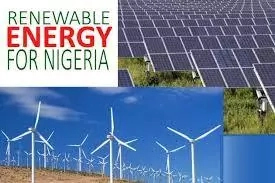As of 2011, energy consumption in Nigeria was around 108 Mtoe. The energy consumed in the country is actually derived from traditional biomass and also from waste, this energy, however, accounts for about 83 percent of total primary production.
Other sources of energy come from fossil fuels, which is about 16 percent and hydropower which is also about 1 percent.
👉 Relocate to Canada Today!
Live, Study and Work in Canada. No Payment is Required! Hurry Now click here to Apply >> Immigrate to CanadaMore so, statistics have revealed that Nigeria has about 35 billion barrels of oil reserves which are about 5.6×109 m3, as well as, 5 trillion cubic meters of gas reserves in the country, and the country is ranked 10th as well as 9th the world over, respectively.
Read Also: Policy on Renewable Energy in Nigeria

Taking a close look at global production, in 2009, it was about 29 billion barrels, that is, 4.6×109 m3 of oil, while natural gas was about 3 trillion cubic meters.
Nigeria however, is one of the members of the Organisation of the Petroleum Exporting Countries.
The penetration of renewable energy in Nigeria is still in its formative level, and its only source in the country is linked to hydro-power, as well as, biomass.
Wind and solar energy are said to have been deployed in just a minuscule amount. Going by the energy policies, it is revealed that, wind and solar energy generation projects in the country are in the planning process.
The study has it that, developments in solar as well as, wind energy are continually increasing, as the high potentials and benefits of these energy sources for Nigeria’s environment and society have been discovered. Nigeria’s Current & Future Projects In RE:
Read Also: Status of Renewable Energy in Nigeria
👉 Relocate to Canada Today!
Live, Study and Work in Canada. No Payment is Required! Hurry Now click here to Apply >> Immigrate to CanadaOut of about 198 million population of Nigeria, the country is only succeeded in supplying power to half of its citizens.
As at present, Nigeria is said to generate just a little amount of energy from its renewable sources, and these sources are hydropower, and solar, wind, and biomass.
However, the Renewable Energy Master Plan (REMP), was in 2005, developed by the Energy Commission of Nigeria, which its idea suggestion was for the renewable energy policies and possible technologies with a view to using the same for the fulfillment of their goals.
The target was to expand energy access to at least, 90 percent of the population of the country by the year, 2030. It is believed that by then, the total generation of energy from renewable sources should be about 30 percent.
By the virtue of Nigeria’s geographical location, which is quite near to the equator, the country has what it takes, in terms of the potential to generate energy from solar.
Cities such as Lagos, and Abuja, and Benin City, and Port Harcourt, and Kaduna, as well as, Kano are currently powered streets lighting with solar energy.
For instance, Low Energy Designs, one company located in the United Kingdom, was actually contracted for the building of solar-powered street lights across the country.
The project, which cost 7 million US dollars is expected to last at least twelve months and will cover over 300 km.
However, there is report making the round that the World Bank is borrowing Nigeria the sum of $350 million to assist the country build a solar power grid by the year, 2023, and Nigeria has maintained that the development will help in the generation of power to hospitals, and rural areas, and schools, as well as households. Nigeria’s Partnership with USAID for Renewable Energy.
Nigeria in February 2018, has completed the Renewable Energy and Energy Efficiency Project, and as a result of the project, about 261,938 Nigerian citizens and residents are being supplied with clean renewable energy.
To meet this goal, Nigeria had to partner USAID, and other private donors, and government agencies, and financial institutions, as well as, non-governmental organizations NGOs.
Read Also: Electricity in Nigeria – Causes Poor Power Supply, and Possible Solutions
The primary objective of the project was for the purpose of building connections to about 2.5 MW of power via both off and on grid sources, which was to help reduce carbon dioxide emissions by at least, 4.5 million metric tons. Nigeria’s Partnership with Chinese Lenders for Renewable Energy.
Another partnership Nigeria had in order to develop and improve renewable energy in the country was with the Chinese lenders. Nigeria has gotten financial assistance from Chinese lenders in order to make sure that, it starts the construction of the Hydro-electric plant in Mambilla.
This idea however to came far back in 1972, and it is now at the verge of being carried out after those number of years.
Chinese lenders are expected to provide about 85 percent of the entire project budget, which is about $5.8 billion dollars, and the federal government is to make provision for the rest of the funding.
The project is about a 3,050-megawatt power plant, and the likelihood is that it will take about five years to complete the project. The project is expected to create at least four (4) dams, and they are to measure up to 50 meters in width and also 150 meters in height.
Renewable Energy Potential ln Nigeria
Renewable energy is said to be suitable in Nigeria, as an alternative source of energy due to favourable climate, and resources, as well as, economic plus societal conditions which are peculiar in Nigeria.
The Northern part of the country, for example, is said to have the highest potential for the alternative source of energy. In fact, it has an average of solar insolation say, 2200 kWh/m^2.
Then in the southern part of the country, it is about 1800 kWh/m^2. The claim is that, with adequate power outputs, solar energy is likely to help Nigeria in the reduction of carbon from fossil-fueled energy generation.
Again, solar power is to also make provision for a reliable, and also a stable source of energy in the country both in the urban areas, as well as, in other locations so as to alleviate the resources-conflict, that is usually associated with oil.
Read Also: How to Start Electrical Business in Nigeria
Conclusion
The study has it that, developments in solar as well as, wind energy are continually increasing, as the high potentials and benefits of these energy sources for Nigeria’s environment and society have been discovered.
